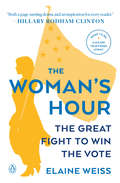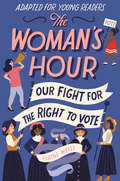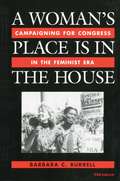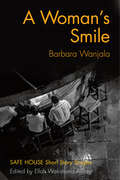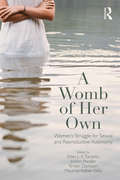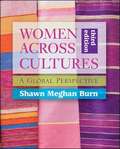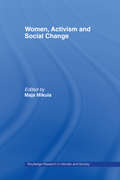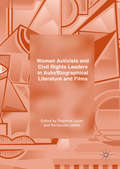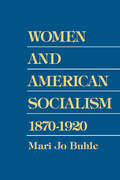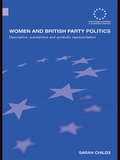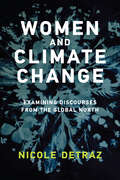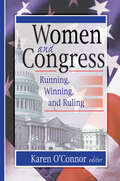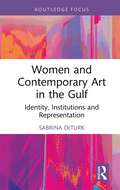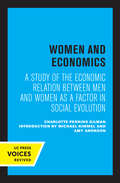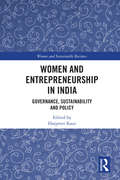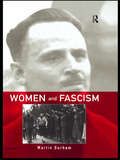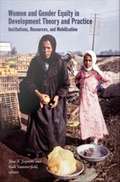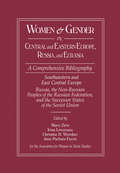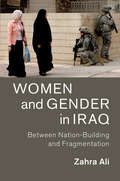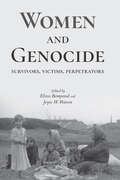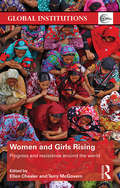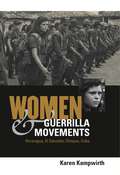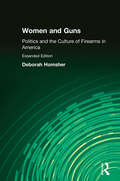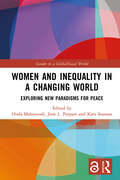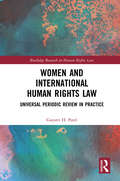- Table View
- List View
The Woman's Hour: The Great Fight to Win the Vote
by Elaine WeissThe nail-biting climax of one of the greatest political battles in American history: the ratification of the constitutional amendment that granted women the right to vote. <P><P>Nashville, August 1920. Thirty-five states have ratified the Nineteenth Amendment, twelve have rejected or refused to vote, and one last state is needed. It all comes down to Tennessee, the moment of truth for the suffragists, after a seven-decade crusade. <P>The opposing forces include politicians with careers at stake, liquor companies, railroad magnates, and a lot of racists who don't want black women voting. <P>And then there are the "Antis"--women who oppose their own enfranchisement, fearing suffrage will bring about the moral collapse of the nation. <P>They all converge in a boiling hot summer for a vicious face-off replete with dirty tricks, betrayals and bribes, bigotry, Jack Daniel's, and the Bible. <P>Following a handful of remarkable women who led their respective forces into battle, along with appearances by Woodrow Wilson, Warren Harding, Frederick Douglass, and Eleanor Roosevelt, The Woman's Hour is an inspiring story of activists winning their own freedom in one of the last campaigns forged in the shadow of the Civil War, and the beginning of the great twentieth-century battles for civil rights.
The Woman's Hour (Adapted for Young Readers): Our Fight for the Right to Vote
by Elaine WeissThis adaptation of the book Hillary Clinton calls "a page-turning drama and an inspiration" will spark the attention of young readers and teach them about activism, civil rights, and the fight for women's suffrage--just in time for the 100th anniversary of the ratification of the Nineteenth Amendment. Includes an eight-page photo insert!American women are so close to winning the right to vote. They've been fighting for more than seventy years and need approval from just one more state. But suffragists face opposition from every side, including the "Antis"--women who don't want women to have the right to vote. It's more than a fight over politics; it's a debate over the role of women and girls in society, and whether they should be considered equal to men and boys. Over the course of one boiling-hot summer, Nashville becomes a bitter battleground. Both sides are willing to do anything it takes to win, and the suffragists--led by brave activists Carrie Catt, Sue White, and Alice Paul--will face dirty tricks, blackmail, and betrayal. But they vow to fight for what they believe in, no matter the cost.
A Woman's Place Is in the House
by Barbara C. BurrellIn this first comprehensive examination of women candidates for the U. S. House of Representatives, Barbara Burrell argues that women are as successful at winning elections as men. Why, then, are there still so few women members of Congress? Compared to other democratically elected national parliaments, the U. S. Congress ranks very low in its proportion of women members. During the past decade, even though more and more women have participated in state and local governments, they have not made the same gains at the national level. A Woman's Place Is in the Houseexamines the experiences of the women who have run for a seat in the U. S. House of Representatives from 1968 through 1992 and compares their presence and performance with that of male candidates. The longitudinal study examines both general and primary elections and refutes many myths associated with women candidates including their ability to raise money and garner support from both interest groups and political parties. According to Burrell, election year 1992 was correctly dubbed the "Year of the Woman" in American politics--not so much because women overcame perceived barriers to being elected but because for the first time a significant number of women chose to run in primaries. Burrell's study examines the effects women are having on the congressional agenda and offers insight on how such issues as term limitations and campaign finance reform will impact on the election of women to Congress. Barbara Burrell (Ph. D. University of Michigan) is professor and director of graduate studies in the Political Science Department at Northern Illinois University where she teaches courses in public opinion, political behavior and women and politics.
A Woman's Smile: Safe House Short Story Singles
by Barbara Wanjala Ellah Wakatama AllfreyIlluminating African narratives for readers both inside and outside the continent. Representing the very best of African creative nonfiction, Safe House brings together works from Africa's contemporary literary greats. In a collection that ranges from travel writing and memoir to reportage and meditative essays, editor Ellah Wakatama Allfrey has brought together some of the most talented writers of creative nonfiction from across Africa. This creative nonfiction single from Safe House anthology is Barbara Wanjala's account of her journey from Kenya to Senegal to meet with LGBT activists in Dakar.
A Womb of Her Own: Women's Struggle for Sexual and Reproductive Autonomy
by Ellen L.K. Toronto Joann Ponder Kristin Davisson Maurine Kelber KellyGender and body-based distinctions continue to be a defining component of women’s identities, both in psychoanalytic treatment and in life. Although females have made progress in many areas, their status within the human community has remained unstable and subject to societal whim. A Womb of Her Own brings together a distinguished group of contributors to explore, from a psychoanalytic perspective, the ways in which women’s sexual and reproductive capabilities, and their bodies, are regarded as societal and patriarchal property, not as the possession of individual women. It further examines how women have been viewed as the "other" and thus become the focus of mistreatment such as rape, sexual slavery, restriction of reproduction rights, and ongoing societal repression. ? Postmodern gender theories have greatly enhanced understanding of the fluidity of gender and freed women from repressive stereotypes, but attention has shifted prematurely from the power differential that continues to exist between men and women. Before the male/female binary is transcended, the limitations imposed upon women by the still prevailing patriarchal order must be addressed. To this end, A Womb of Her Own addresses issues such as the prevalence of rape culture and its historical roots; the relationship of the LGBT movement to feminism; current sexual practices such as sexting and tattooing and their meaning to women; reproductive issues including infertility; adoption; postpartum depression and the actual experience of birthing—all from the perspectives of women. The book also explores the cultural definitions of motherhood, and how such definitions set exacting standards both for the acceptable face of motherhood and for women generally. While women’s unique anatomy and biology have historically contributed to their oppression in a patriarchal society, it is the exploration and illumination of these capabilities from their own perspective that will allow women to claim and control them as their own. Covering a broad, topical range of contemporary subjects, A Womb of Her Own will appeal to psychoanalysts, psychoanalytic psychotherapists, as well as scholars and students of gender and women’s studies.
Women Across Cultures: A Global Perspective (Third Edition)
by Shawn Meghan BurnWomen Across Cultures examines contemporary women's issues and empowerment from a global perspective. Gender inequality is examined as a historical, sociocultural phenomenon within the context of interlocking systems of inequality such as racism, colonialism, and economic injustice.
Women, Activism and Social Change: Stretching Boundaries (Routledge Research in Gender and Society #Vol. 11)
by Maja MikulaThroughout history, women have participated in and sometimes initiated rebellions to defend the welfare of their family, community, class, race or ethnic group.This volume presents original research on women's activism in Asia, Europe, Australia and Latin America. It explores how women have advanced social change and their influence on, and response to, existing transformations in society. Using an interdisciplinary approach, the authors examine women's activities and conditions in diverse social and political contexts, from revolutionary societies, to status quo societies, to societies in decline. With its primary focus on agency and social change, this book deconstructs patriarchal discourses and unearths aspects of female agency in an array of cultural, historical and geopolitical contexts. Chapters on movements in China, Japan, Australia, Croatia, Russia and a range of other countries both contribute to our understanding of change in those societies and seek to locate women at the center of politically aware movements. Although not exclusively a book about feminist activism, this essential collection is motivated by the feminist desire to restore to history a range of women's experiences.This book introduces new ways of thinking across boundaries, identities and complexities in a still essentially patriarchal world. It will be of great interest to students and researchers in the fields of gender studies, activism and comparative politics.
Women Activists and Civil Rights Leaders in Auto/Biographical Literature and Films
by Benaouda Lebdai Delphine LetortThis collective book offers new insight on the genres of biography and autobiography by examining the singular path of those deemed to be ‘outsiders’, such as Winnie Mandela, Ida B. Wells, Malcolm X and Harvey Milk. Its specific focus on these female leaders and civil rights activists, who refused to be constrained by gender, race and class, shifts attention away from the great men of history and places it solely on those who have transformed their personal lives into a fight for collective goals. With an interdisciplinary approach that looks at literature, cinema and cultural studies, Women Activists and Civil Rights Leaders in Auto/Biographical Literature and Cinema argues that life writing is a key source of artistic creativity and activism which enables us to take a fresh look at history.
Women and American Socialism, 1870-1920 (Working Class in American History)
by Mari Jo BuhleSocialist women faced the often thorny dilemma of fitting their concern with women's rights into their commitment to socialism. Mari Jo Buhle examines women's efforts to agitate for suffrage, sexual and economic emancipation, and other issues and the political and intellectual conflicts that arose in response. In particular, she analyzes the clash between a nativist socialism influence by ideas of individual rights and the class-based socialism championed by German American immigrants. As she shows, the two sides diverged, often greatly, in their approaches and their definitions of women's emancipation. Their differing tactics and goals undermined unity and in time cost women their independence within the larger movement.
Women and British Party Politics: Descriptive, Substantive and Symbolic Representation (Routledge Advances in European Politics #Vol. 51)
by Sarah ChildsWomen and British Party Politics examines the characteristics of women’s participation at the mass and elite level in contemporary British politics; as voters, party members and elected representatives respectively. It explores what this means for ideas about, and the practice of, descriptive, substantive and symbolic representation. The main focus is on the feminization of British party politics - the integration of women into formal political institutions and the integration of women’s concerns and perspectives into political debate and policy - in the post-1997 period. Not only specifically designed to bring together cutting-edge conceptual developments in the sub-discipline of gender and politics, with robust British empirical research, this book also presents reflections on how best to study gender and politics. The empirical findings which are presented through the extensive use of case studies derive from a range of research projects which were undertaken over a period of ten years, and which make use of a variety of research methods and techniques. This book will appeal to all those with an interest in British Politics, Feminism and European Studies; and will provide the reader with an overview of the complex relationship between sex, gender and politics in a conceptually sophisticated fashion.
Women and Climate Change: Examining Discourses from the Global North
by Nicole DetrazHow ideas of gender and climate change intersect with our path to a livable future.When you think "climate change," who comes to mind? Who's doing the science, the reporting, the protesting, the suffering? In Women and Climate Change, Nicole Detraz asks where women in the Global North figure in the picture, what that means, and why it matters. Her answers fill critical gaps in what we know about the politics of climate change and gender.Representations of climate change, like perceptions of gender, can make a profound difference in understanding expectations and actions around social, cultural, and political issues. Interviewing women living in the Global North who work in the climate change sphere, Detraz examines the crucial links between notions of climate change and gender—in particular, how women are portrayed in climate change debates. Where is their presence or absence recognized? What tasks are they expected to perform? What factors influence their roles? The answers provide a nuanced account of the characteristics, conditions, and positions associated with women's activities in and experiences of climate change—a multifaceted portrayal of women that also demonstrates the generalization and essentializing that can hinder goals of sustainability and gender justice.Because gender is a social construction, Detraz reminds us, change is possible. Her book offers the suggestion, and the hope, that identifying connections between ideas of gender and climate change might also alter our vision of a livable future.
Women and Congress: Running, Winning, and Ruling
by Karen O'ConnorExplore the effects women have had on Congress!Containing vital insights into the role women play in Congress, Women and Congress: Running, Winning, and Ruling is a unique look into the political standing of female candidates and congresswomen. Chapters written by noted political scientists consider the challenges of being a congresswoman in the male-dominated political arena, illustrate the fundamental and advanced techniques vital to winning an election, and show how congresswomen have been most effective once in office.Women and Congress brings you thoughtful discussions of: how campaign finance, speaking on the floor, introducing new legislation, and political action committees have contributed to the success of women politicians the effect of media on election outcomes, including the media&’s portrayal of women and the ways female candidates present themselves to the media discrimination against women in media coverage differences in the ways Democratic and Republican women view political issues the political glass ceiling (how incumbency, gender, and strategy play a role in elections) and much more!
Women and Contemporary Art in the Gulf: Identity, Institutions and Representation (Cultural Heritage, Art and Museums in the Middle East)
by Sabrina DeTurkWomen and Contemporary Art in the Gulf offers a unique focus on the roles of women in contemporary art, cultural production and arts institutions in the Gulf. Drawing on in-person experiences of the art and sites discussed, as well as research on regional artists and arts institutions, DeTurk argues that the Gulf Cooperation Council (GCC) countries of Bahrain, Kuwait, Oman, Qatar, Saudi Arabia and the United Arab Emirates have been largely excluded from the critical discourse about, and display of, contemporary Middle Eastern art. The book addresses this oversight by providing an examination of the work of several contemporary women artists from the Gulf region. DeTurk also discusses the role of women in museums and cultural institutions in the region, as well as the education systems available to emerging women artists. The discussion and analysis at the heart of the book connect to a range of larger themes, including the visual culture of patriarchy, connection to material culture and heritage, religious beliefs, trade and migration, rapid development, and the need to envision and create a post-oil economy. Women and Contemporary Art in the Gulf, with its examination of the critical role women play in the formation of the cultural landscape of the Gulf, is an important contribution to discourse around the changing role of the GCC. It will be essential reading for scholars and students engaged in the study of art history, visual culture, museums and heritage, and women and gender studies.
Women and Economics: A Study of the Economic Relation Between Men and Women as a Factor in Social Evolution
by Charlotte Perkins GilmanWhen Charlotte Perkins Gilman's first nonfiction book, Women and Economics, was published exactly a century ago, in 1898, she was immediately hailed as the leading intellectual in the women's movement. Her ideas were widely circulated and discussed; she was in great demand on the lecture circuit, and her intellectual circle included some of the most prominent thinkers of the age. Yet by the mid-1960s she was nearly forgotten, and Women and Economics was long out of print. Revived here with new introduction, Gilman's pivotal work remains a benchmark feminist text that anticipates many of the issues and thinkers of 1960s and resonates deeply with today's continuing debate about gender difference and inequality. Gilman's ideas represent an integration of socialist thought and Darwinian theory and provide a welcome disruption of the nearly all-male canon of American economic and social thought. She stresses the connection between work and home and between public and private life; anticipates the 1960s debate about wages for housework; calls for extensive childcare facilities and parental leave policies; and argues for new housing arrangements with communal kitchens and hired cooks. She contends that women's entry into the public arena and the reforms of the family would be a win-win situation for both women and men as the public sphere would no longer be deprived of women's particular abilities, and men would be able to enlarge the possibilities to experience and express the emotional sustenance of family life. The thorough and stimulating introduction by Michael Kimmel and Amy Aronson provides substantial information about Gilman's life, personality, and background. It frames her impact on feminism since the Sixties and establishes her crucial role in the emergence of feminist and social thought. This title is part of UC Press's Voices Revived program, which commemorates University of California Press's mission to seek out and cultivate the brightest minds and give them voice, reach, and impact. Drawing on a backlist dating to 1893, Voices Revived makes high-quality, peer-reviewed scholarship accessible once again using print-on-demand technology. This title was originally published in 1998.
Women and Entrepreneurship in India: Governance, Sustainability and Policy (Women and Sustainable Business)
by Harpreet KaurThe Indian Constitution is the largest written constitution that guarantees equality to women and empowers the State to take affirmative actions in favour of women. India has adopted International conventions for protection of rights of women and granting them equality and ratified the Convention on Elimination of All Forms of Discrimination Against Women (CEDAW) in the year 1993. The National Policy for Women Empowerment was presented in 2001, the goal of that policy to bring about the advancement, development and empowerment of women and enable women to become financially independent. Currently, India is the only country where the economic gender gap is larger than the political gender gap. Women are required to understand their own potential and overcome social barriers. With constant support of the government, change in stereotype mindset and skill development in women, India will continue witnessing gradual increase in women entrepreneurship in future. The aim of this book is to show the latest state of knowledge on the topic of women entrepreneurship, the role of women in business and women empowerment in India. Many aspects relating to role of women in business, sustainable business development and aspects going beyond economic empowerment of women are discussed in addition to presenting legal and regulatory frameworks. This book will be of interest to researchers, academics, policymakers, and students in the fields of entrepreneurship, empowerment, gender studies, and law.
Women and Fascism
by Martin DurhamThis seminal book challenges the common assumption that fascism is a misogynist movement which has tended to exclude women. Using examples from Germany, Italy and France, Durham analyses the rise of women in fascist organizations across Europe from the early twenties to the present. Unusually, however, the author focuses on British fascism and in doing so he offers valuable new perspectives on fascist attitudes to women. Offering interesting examples of women training in armed combat, and more generally as voters and members of fascist organizations, he highlights women's relationship to fascist policies on birth rate, abortion and eugenics.
Women and Gender Equity in Development Theory and Practice: Institutions, Resources and Mobilization
by Jane S. Jaquette Gale SummerfieldSeeking to catalyze innovative thinking and practice within the field of women and gender in development, editors Jane S. Jaquette and Gale Summerfield have brought together scholars, policymakers, and development workers to reflect on where the field is today and where it is headed. The contributors draw from their experiences and research in Latin America, Asia, and Africa to illuminate the connections between women's well-being and globalization, environmental conservation, land rights, access to information technology, employment, and poverty alleviation. Highlighting key institutional issues, contributors analyze the two approaches that dominate the field: women in development (WID) and gender and development (GAD). They assess the results of gender mainstreaming, the difficulties that development agencies have translating gender rhetoric into equity in practice, and the conflicts between gender and the reassertion of indigenous cultural identities. Focusing on resource allocation, contributors explore the gendered effects of land privatization, the need to challenge cultural traditions that impede women's ability to assert their legal rights, and women's access to bureaucratic levers of power. Several essays consider women's mobilizations, including a project to provide Internet access and communications strategies to African NGOs run by women. In the final essay, Irene Tinker, one of the field's founders, reflects on the interactions between policy innovation and women's organizing over the three decades since women became a focus of development work. Together the contributors bridge theory and practice to point toward productive new strategies for women and gender in development. Contributors. Maruja Barrig, Sylvia Chant, Louise Fortmann, David Hirschmann, Jane S. Jaquette, Diana Lee-Smith, Audrey Lustgarten, Doe Mayer, Faranak Miraftab, Muadi Mukenge, Barbara Pillsbury, Amara Pongsapich, Elisabeth Prgl, Kirk R. Smith, Kathleen Staudt, Gale Summerfield, Irene Tinker, Catalina Hinchey Trujillo
Women and Gender in Central and Eastern Europe, Russia, and Eurasia: A Comprehensive Bibliography Volume I: Southeastern and East Central Europe (Edited by Irina Livezeanu with June Pachuta Farris) Volume II: Russia, the Non-Russian Peoples of the Russian
by Mary Zirin Irina Livezeanu Christine D. Worobec June Pachuta FarrisThis is the first comprehensive, multidisciplinary, and multilingual bibliography on "Women and Gender in East Central Europe and the Balkans (Vol. 1)" and "The Lands of the Former Soviet Union (Vol. 2)" over the past millennium. The coverage encompasses the relevant territories of the Russian, Hapsburg, and Ottoman empires, Germany and Greece, and the Jewish and Roma diasporas. Topics range from legal status and marital customs to economic participation and gender roles, plus unparalleled documentation of women writers and artists, and autobiographical works of all kinds. The volumes include approximately 30,000 bibliographic entries on works published through the end of 2000, as well as web sites and unpublished dissertations. Many of the individual entries are annotated with brief descriptions of major works and the tables of contents for collections and anthologies. The entries are cross-referenced and each volume includes indexes.
Women and Gender in Iraq: Between Nation-Building and Fragmentation (Cambridge Middle East Studies #51)
by Zahra AliSince the US-led invasion and occupation of Iraq in 2003, the challenges of sectarianism and militarism have weighed heavily on the women of Iraq. In this book, Zahra Ali foregrounds a wide-range of interviews with a variety of women involved in women's rights activism, showing how everyday life and intellectual life has developed since the US-led invasion. In addition to this, Ali offers detailed historical research of social, economic and political contexts since the formation of the Iraqi state in the 1920s. Through a transnational and postcolonial feminist approach, this book also considers the ways in which gender norms and practices, Iraqi feminist discourses, and activisms are shaped and developed through state politics, competing nationalisms, religious, tribal and sectarian dynamics, wars, and economic sanctions. The result is a vivid account of the everyday life in today's Iraq and an exceptional analysis of the future of Iraqi feminisms.
Women and Genocide: Survivors, Victims, Perpetrators
by Elissa Bemporad and Joyce W. WarrenEssays that use “gender as a critical lens for staging intersectional, multidisciplinary investigations of genocide in the 20th and 21st centuries” (Reading Religion).The genocides of modern history—Rwanda, Armenia, Guatemala, the Holocaust, and countless others—and their effects have been well documented, but how do the experiences of female victims and perpetrators differ from those of men? In Women and Genocide, human rights advocates and scholars come together to argue that the memory of trauma is gendered and that women’s voices and perspectives are key to our understanding of the dynamics that emerge in the context of genocidal violence. The contributors of this volume examine how women consistently are targets for the sexualized violence that serves as an instrument of ethnic cleansing, how female perpetrators take advantage of the new power structures, and how women are involved in the struggle for justice in post-genocidal contexts. By placing women at center stage, Women and Genocide helps us to better understand the nexus existing between misogyny and violence in societies where genocide erupts.“It elegantly bridges the historical divide between the study of political violence and the study of gendered violence in the so-called domestic sphere . . . Women and Genocide is an immense scholarly accomplishment that has the potential to fund creative advances in each of the scholarly disciplines it engages, as well as human rights, peace, and anti-violence programs of advocacy.” —Reading Religion
Women and Girls Rising: Progress and resistance around the world (Global Institutions)
by Ellen Chesler Terry McGovernA growing body of evidence demonstrates that improvements in the status of women and girls – however worthy and important in their own right – also drive the prosperity, stability, and security of families, communities, and nations. Yet despite many indicators of progress, women and girls everywhere – including countries of the developed world – continue to confront barriers to their full and equal participation in social, economic, and political life.Capturing voices and experiences from around the world, this work documents the modern history of the global women’s movement - its many accomplishments and setbacks. Drawing together prominent pioneers and contemporary policymakers, activists, and scholars, the volume interrogates where and why progress has met resistance and been slowed, and examine the still unfinished agenda for change in national and international policy arenas. This history and roadmap are especially critical for younger generations who need a better understanding of this rich feminist legacy and the intense opposition that women’s movements have generated.This book creates a clear and forceful narrative about women’s agency and the central relevance of women’s rights movements to global and national policy-making.. It is essential reading for activists and policymakers, students and scholars alike.
Women and Guerrilla Movements: Nicaragua, El Salvador, Chiapas, Cuba (G - Reference, Information and Interdisciplinary Subjects)
by Karen KampwirthThe revolutionary movements that emerged frequently in Latin America over the past century promoted goals that included overturning dictatorships, confronting economic inequalities, and creating what Cuban revolutionary hero Che Guevara called the "new man." But, in fact, many of the "new men" who participated in these movements were not men. Thousands of them were women. This book aims to show why a full understanding of revolutions needs to take account of gender. Karen Kampwirth writes here about the women who joined the revolutionary movements in Nicaragua, El Salvador, and the Mexican state of Chiapas, about how they became guerrillas, and how that experience changed their lives. In the last chapter she compares what happened in these countries with Cuba in the 1950s, where few women participated in the guerrilla struggle. Drawing on more than two hundred interviews, Kampwirth examines the political, structural, ideological, and personal factors that allowed many women to escape from the constraints of their traditional roles and led some to participate in guerrilla activities. Her emphasis on the experiences of revolutionaries adds a new dimension to the study of revolution, which has focused mainly on explaining how states are overthrown.
Women and Guns: Politics and the Culture of Firearms in America
by Deborah HomsherThis timely and provocative book looks at contemporary American women and their experiences with guns. Scrupulously balanced, this new paperback edition features a new appendix containing a wealth of primary source documents that help illuminate both the dangers and attractions of guns in our society.
Women and Inequality in a Changing World: Exploring New Paradigms for Peace (Gender in a Global/Local World)
by Hoda Mahmoudi Jane L. Parpart Kate SeamanWomen and Inequality in a Changing World explores the obstacles women continue to face to their equal participation in all areas of daily life—political, social, and economic—which persist despite the growth in the education of girls, large-scale social movements, and political waves. The volume widens and deepens understanding of women in relation to the inequalities they face, based not only on gender, but also on race, class, religion, and more. It also highlights the progress that women have made, and how this progress contributes to the creation of more peaceful and prosperous societies. This interdisciplinary book brings together leading scholars and practitioners from across the globe to provide a wide range of perspectives and experiences, examine crucial questions, and offer new ideas and innovative solutions to increasing the role of women moving forward. This book will be of great interest to students and scholars of gender studies, women’s studies, and political science, as well as practitioners working at the intersection of women and global issues. The Open Access version of this book, available at www.taylorfrancis.com, has been made available under a Creative Commons Attribution-Non Commercial-No Derivatives 4.0 license. Please note that Chapter 6 is excluded from this Creative Commons license. Pieces of this chapter were previously published in: Golan, G., ‘Autobiographical Note’ in Galia Golan: An Academic Pioneer on the Soviet Union, Peace and Conflict Studies, and a Peace and Feminist Activist (PAHSEP, Vol. 22), published 2018, Springer International Publishing, reproduced with permission of SNCSC. The author is grateful to the publisher for permission to reuse the material, which is still copyright protected and owned by the publisher.
Women and International Human Rights Law: Universal Periodic Review in Practice (Routledge Research in Human Rights Law)
by Gayatri H. PatelThis book presents the findings of the first comprehensive study on the most recent and most unique and innovative method of monitoring international human rights law at the United Nations. Since its existence, there has yet to be a complete and comprehensive book solely dedicated to exploring the Universal Periodic Review (UPR) process. Women and International Human Rights Law provides a much-needed insight to what the process is, how it operates in practice, and whether it meets its fundamental aim of promoting the universality of all human rights. The book addresses the topics with regard to international human rights law and will be of interest to researchers, academics, and students interested in the monitoring and implementation of international human rights law at the United Nations. In addition, it will form supplementary reading for those students studying international human rights law on undergraduate programmes and will also appeal to academics and students with interests in political sciences and international relations.
